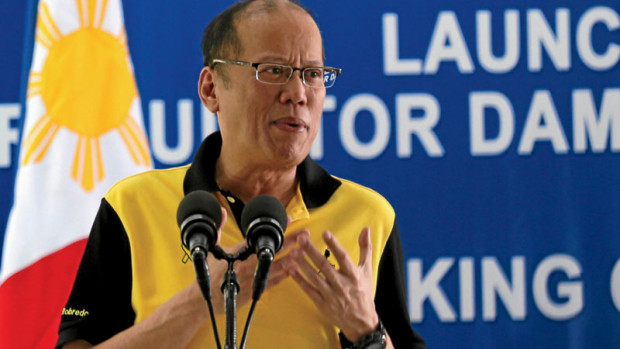Aquino insists no probable cause to be charged over DAP
Former President Benigno Aquino III has opposed the plea of progressive activists for the Ombudsman to indict him alongside his Budget Secretary Florencio Abad over the outlawed Disbursement Acceleration Program.
Aquino was directed by the Ombudsman to comment on the appeal filed by Bayan Muna Rep. Carlos Isagani Zarate and other complainants on the March 3 resolution that let him off the hook but found probable cause to charge Abad for usurpation of legislative powers.
He did not directly address the contention that the Ombudsman’s resolution, described as an “attempt to shield” him, did not even explain why he would not be prosecuted for the said offense.
READ: Ombudsman hit for clearing Aquino on DAP
Instead, Aquino, in his 20-page comment filed before the Ombudsman, sought the dismissal of the motion for reconsideration filed through the National Union of People’s Lawyers for being a mere rehash of the complainants’ earlier arguments.
Article continues after this advertisementHe also said the Ombudsman’s resolution was fair. “The Honorable Office’s determination that there was no sufficient ground to engender a well-founded belief that the offenses charged were committed is grounded on adequate factual and legal bases,” the comment read.
Article continues after this advertisementWashing his hands of liability, he insisted he “only performed core executive functions” and did not usurp Congress’ power of the purse.
As President, he said he only exercised his prerogative to augment budgetary items under Article VI, Section 25(5) of the Constitution “upon being notified that savings were already available.”
It is the Department of Budget and Management that actually determines the availability of savings, since it falls under the “technical province,” Aquino argued.
He added that “no President is obligated to determine how savings are accumulated, much less how they are ‘withdrawn.'”
“In their view, the issuances would not have been effective without Respondent’s [Aquino] approval, thus a finding of probable cause to indict Respondent Abad should necessarily include the approving authority. Complainants’ contention is simply misplaced,” the comment read.
At the same time, Aquino reiterated there was no probable cause to charge him with technical malversation because he was not considered under the law as an “accountable officer” who directly had custody of public money.
READ: Morales insists: No proof Aquino liable for DAP
He added the issuance of budget circulars and memoranda is not considered an “application”—or actual spending—of the funds.
Aquino said he could not be held liable for graft either because he was in good faith for attempting to speed up infrastructure spending and usher in benefits to the Philippine economy. He also claimed the complainants failed to prove that DAP caused undue injury to the government.
“More abysmal is that Complainants did not even bother to study the voluminous DAP records and actually specify where in those records was actual damage shown. This only goes to show how miserably overeager they are to conjure claims of undue injury when none exists in the first place,” the comment read.
Aquino was directed to comment after the complainants questioned the lack of explanation on why Aquino was absolved of criminal liability and why the Ombudsman ignored Aquino’s own DAP-related issuances.
The complainants said Aquino approved DAP in October 2011 and Abad’s request to withdraw and pool the unutilized funds for the first half of 2012.
For them, National Budget Circular No. 541, the issuance cited by the Ombudsman resolution, merely confirmed Aquino’s prior actions and Abad could not have issued it without the president’s approval.
“The Decision, in its attempt to shield Aquino, mentioned only NBC 541 apparently as the only document/act which ‘unduly modified, expanded the meaning of savings under the GAA (general appropriations act),’” the appeal stated.
The Supreme Court in July 2014 declared certain budgetary practices under DAP unconstitutional, granting the petition by several personalities including Colmenares.
The outlawed practices include the cross-border transfer of funds and the declaration of savings before the end of the fiscal year in order to realign them for items not contained in the budget law passed by Congress./rga
